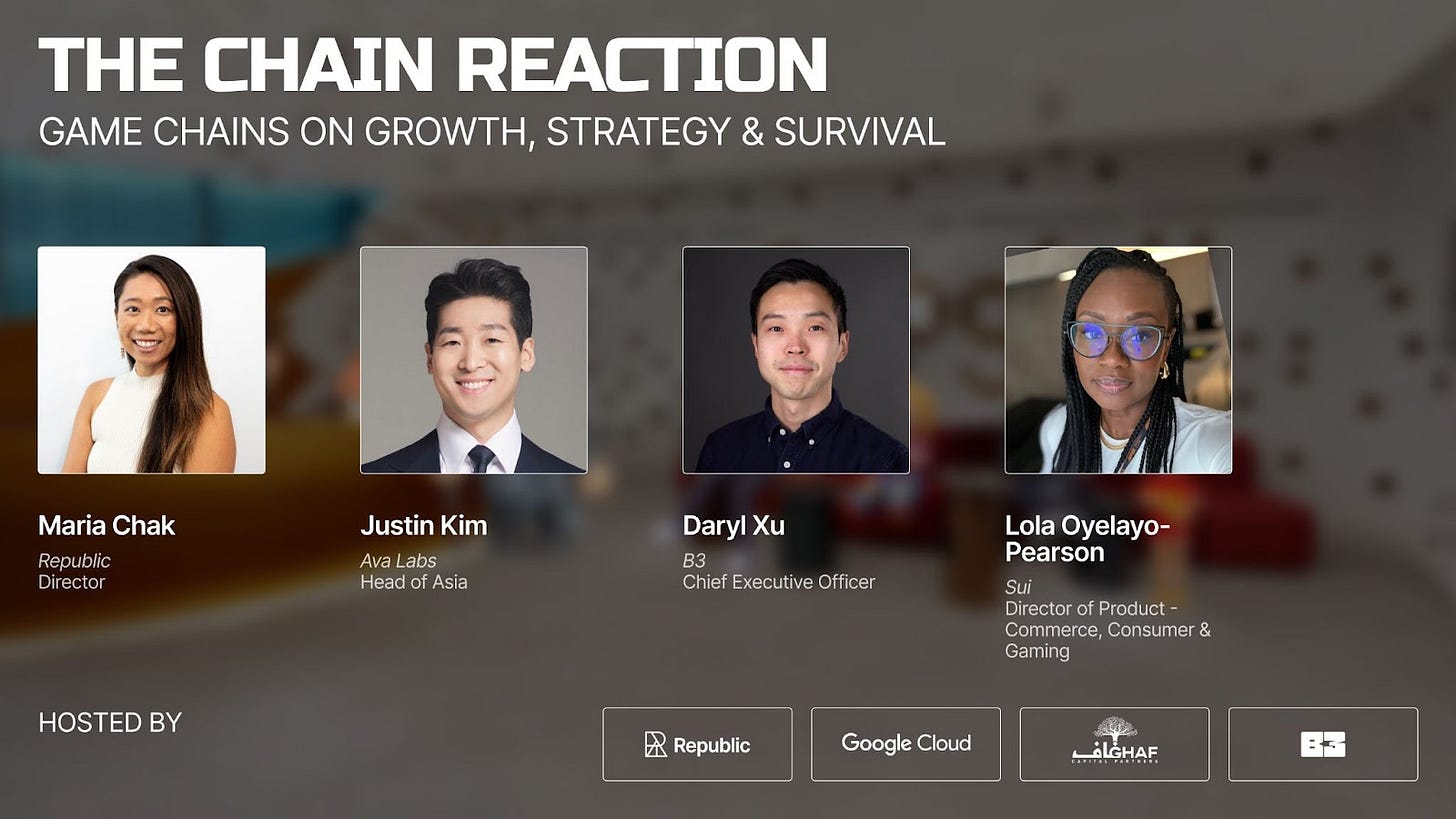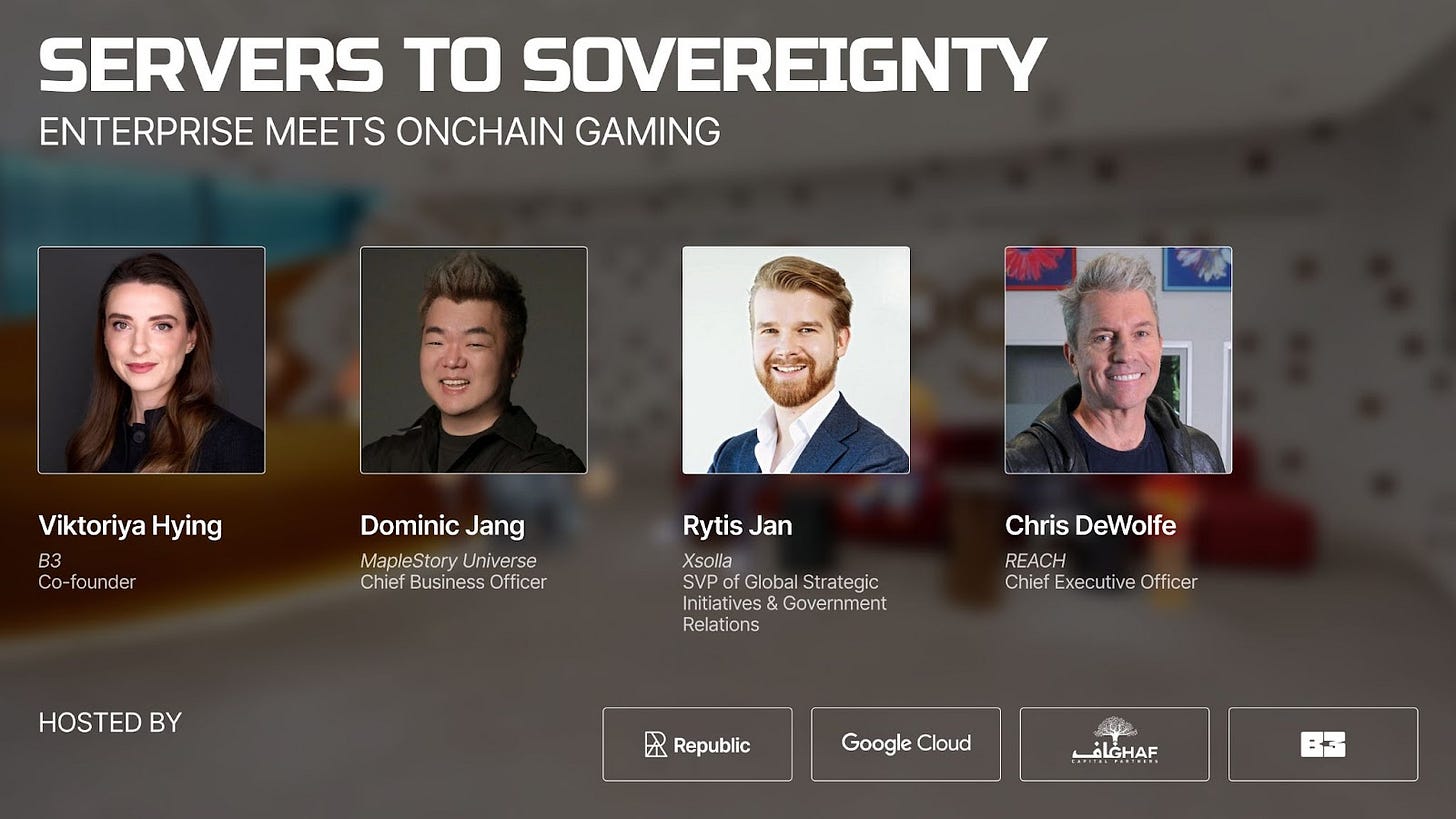At Token2049 Dubai 2025, Republic Crypto, Google Cloud, Ghaf Capital, and B3 came together to co-host RESPΛWN, a private half-day summit designed for builders—not spectators. This wasn’t just another conference. It was a curated effort to bring clarity to a space too often clouded by noise.
With over 70 carefully selected attendees—including founders, investors, chain teams, and gaming executives—and a waitlist of more than 200, the signal was clear: the industry is craving depth, not scale.
Not Another Conference—A Summit That Meant Something
RESPΛWN was created as an intentional departure from the typical conference format. Rather than noisy expo floors and surface-level networking, this summit prioritized thoughtful dialogue, curated participation, and space for genuine connections. It marked the first collaboration between Maria, Cathleen, and Grace—three operators who saw a gap in the ecosystem and filled it with clarity and purpose.
Why the Middle East, Why Now?
A major thread across the day was the growing role of the Middle East—not just as a source of capital, but as an emerging center of gravity for gaming and Web3. Governments in Saudi Arabia, the UAE, and Abu Dhabi are backing the industry with real capital, clear regulatory frameworks, and long-term vision. This isn’t headline-chasing. It’s strategic.
Key initiatives include:
Saudi Arabia’s $38B gaming strategy, including its $4.9B acquisition of Scopely.
Abu Dhabi’s $150M gaming fund and the appointment of a dedicated government lead to drive studio and talent attraction.
Dubai’s Web3 regulatory frameworks, including VARA, DMCC, and ADGM, offering 0% tax and fast-track licensing.
This regional momentum reflects something deeper: a push to diversify economies, engage younger populations, and become global players in digital culture.
For Founders: A Different Playbook
There’s real appetite for innovation in the Middle East—but it comes with a different playbook. Unlike in the West, where capital can follow a single meeting, funding here flows through relationships, consistency, and strategic alignment—not pitch decks. Cultural fit often matters more than product-market fit.
A common misstep: assuming the goal is to raise directly from government entities. But government capital isn’t venture funding—it’s tied to long-term, GDP-aligned outcomes. If you're not planning to relocate, build locally, or create jobs in the region, you're unlikely to fit the mandate.
That said, early-stage founders are best positioned in Dubai, where local VCs and family offices like Cypher Capital, Morningstar Ventures and New Tribe Capital are actively investing in gaming, infrastructure, and emerging tech. In this region, capital follows conviction—not momentum.
Setting the Stage
With this regional shift as backdrop, RESPΛWN set out to explore the full stack of the Web3 gaming economy—across three tightly focused panels:
🎮 Panel 1: The Chain Reaction — Game Chains on Growth, Strategy & Survival
Infrastructure chains are no longer just back-end providers—they’re becoming active partners, publishers, and growth engines for games. [Watch now]
🏢 Panel 2: From Servers to Sovereignty — Enterprise Meets On-Chain Gaming
Major studios like Nexon, Xsolla, and REACH unpacked the realities of blockchain adoption at scale. [Watch now]
📈 Panel 3: Exit or Expand — What Gaming Investors Are Betting on in 2025
Leading VCs discussed the future of token launches, capital models, and what it really takes to build trust with players and investors alike. [Watch now]
Each session unpacked what’s working, what’s misunderstood, and what’s next. Here’s what we learned.
Panel Highlights
Panel 1: The Chain Reaction — Growth, Strategy & Survival in Game Chains
Panel 1 Speakers:
Justin Kim, Head of Asia Ava Labs
Lola Oyelayo-Pearson, Director of Commerce, Consumer and Gaming Product Mysten Labs/Sui
Moderated by Maria Chak, Director, Republic Crypto
While most chains market themselves as “founder-friendly,” the discussion revealed a more complex reality. A clear theme emerged: chains are evolving from pure infrastructure providers into active publishing and distribution partners.
Avalanche: Flexibility + Support
Avalanche emphasized a modular, multichain approach that allows studios to build customizable subnets—avoiding performance bottlenecks. But the real differentiator, according to Justin Kim, is white-glove support. Their partnership with Gunzilla, a studio launching Off the Grid to over 200 million players, shows how direct collaboration—not just infrastructure—helps games ship and scale. For Avalanche, success is measured by outcomes, not theoretical throughput.
Sui: Full-Stack Commitment
Lola Oyelayo-Pearson outlined Sui’s vertically integrated strategy, including an experiment in hardware distribution to demonstrate their long-term commitment to studios. “We built it once to show we could—but we won’t build it again,” she said, reinforcing that Sui's focus is on solving distribution challenges, not just software scalability. Unlike Avalanche, Sui is cautious about a multichain future, favoring tighter UX control through a unified stack.
B3: Distribution First
Daryl Xu positioned B3 not as a chain, but as a Web3-native publisher. Infrastructure is table stakes; the challenge is player acquisition at scale. B3 is testing new formats—TikTok campaigns, real-world stunts like a life-sized Pong paddle, and frictionless onboarding—that meet players where they are. As Xu put it
“Crypto is part of the story, but it’s not the headline.”
Just seven months post-mainnet, B3 has already onboarded 6.5 million wallets and launched a diverse portfolio of games—from casual mobile titles to AAA shooters. With upcoming releases from studios like SuperGaming and Parallel, their thesis is clear: genre variety and low-friction experiences will define the next wave of breakout hits.
Key Takeaways
1. Token Incentives Can’t Replace Real Engagement
Early traction from token incentives can be useful, but it doesn’t translate to long-term retention. Gameplay is still king.
2. Quality Games Require Patience
The pressure to ship fast in Web3 is real—but building high-quality, engaging games is a multi-year journey. Chains that support that timeline—financially and structurally—are better long-term allies.
3. AI Is Emerging, But Not Yet Core
AI wasn’t central to the discussion, but its role in optimizing elements like NPC behavior and procedural content is growing. While not a competitive battleground today, AI-enhanced tooling may soon influence chain strategies.
Panel 2: From Servers to Sovereignty — Enterprise Meets On-Chain Gaming
Panel 2 Speakers:
Dominic Jang, Chief Business Officer, MapleStory Universe (Nexon)
Rytis Jan, SVP of Global Strategic Initiatives & Government Relations, Xsolla
Chris DeWolfe, CEO, REACH
Moderated by Victoria Hying, Co-Founder, B3
This session examined how established gaming enterprises are approaching Web3—what’s motivating them, where they see value, and what’s still holding them back.
Why Enterprises Are Exploring Web3
For MapleStory Universe, the trigger was inflation pressure within traditional free-to-play models. Dominic Jang highlighted the limits of endlessly scaling in-game economies without giving players meaningful ownership. Their team sees blockchain as a way to drive sustainability and empower players.
Xsolla offered a more cautious view. Rytis Jan described blockchain not as a revolution, but as a utility. If it solves real user problems, it’s valuable—otherwise, it’s optional. For Xsolla, Web3 is an enhancement to seamless commerce, not a foundational shift.
REACH’s Chris DeWolfe shared a long-term vision: a decentralized gaming future where players aren’t locked into platform monopolies. But the road there isn’t easy. He acknowledged ongoing obstacles—particularly around token model complexity and global regulation.
Key Takeaways
1. Web3 Must Be Additive, Not Disruptive
Across the board, panelists agreed: blockchain shouldn’t be forced into the game loop. Adoption will only come if Web3 features enhance gameplay, rather than complicating it.
2. Fun Comes First
The path to mainstream success starts with great games. Utility and ownership are important, but they won’t matter if the game itself isn’t engaging.
3. Regulation and Tokenomics Remain Headwinds
Complex legal environments and the difficulty of designing sustainable token economies are still major barriers—especially for larger studios with established business models.
Panel 3: Exit or Expand? — What Gaming Investors Are Betting on in 2025
Panel 3 Speakers:
Karan, Partner, Cypher Capital
Juliet, Fund Partner, New Tribe Capital
Moderated by Alex Ye, Vice President, Republic Crypto
This session focused on how investors are thinking about token launches, market cycles, and value creation—and what founders need to get right before going to market.
Rethinking Tokenomics and Vesting
The panel opened with a hard look at vesting structures. Karan compared tokens to “micro-nations,” where long-term value depends on stable, coordinated development—not short-term unlocks. Juliet outlined two potential trust-building models:
Token distribution governed by independent foundations and milestone-based unlocks.
A 100% full unlock to let the market determine real value from day one.
The message was clear: fast-vesting cycles have damaged trust, and future success will depend on more transparent, disciplined token designs.
A Shift Toward Institutional Discipline
Looking back at past cycles, Alex noted the swing from retail-led ICO booms to today’s institutional era, fueled by sovereign wealth funds and traditional capital. These investors are no longer chasing hype—they’re backing credible teams, clear roadmaps, and durable projects.
Ryan emphasized the behind-the-scenes role of VCs: facilitating partnerships, strategic intros, and biz-dev support. He encouraged founders to communicate how investor tokens are used to fuel long-term growth—not just unlock short-term liquidity.
Equity vs. Tokens — What’s the Right Move?
When asked if founders should consider skipping tokens altogether, the panel offered a simple framework:
If you generate revenue and lack a user community, equity is likely the better route.
If you already have engaged users, tokens can supercharge your economy—but only if the core game loop is working.
The conversation also addressed single-title tokens vs. platform models. Juliet cautioned that one-off games rarely sustain momentum without IP depth or strong distribution. Token rewards often attract speculators instead of real players.
Key Takeaways
1. Trust in Tokenomics Must Be Rebuilt
Poor vesting practices in previous cycles have eroded confidence. Models that tie token unlocks to audited milestones or transparent market mechanisms are gaining favor.
2. Institutional Capital Is Here—and Selective
Today’s investors are looking beyond short-term returns. Teams that show discipline, alignment, and long-term strategy are best positioned to raise from institutional sources.
3. Use Tokens Strategically—Not by Default
Tokens work best when there’s already community momentum and in-game utility. Otherwise, stick with equity until the fundamentals are proven.
4. Wait to Launch. Build First.
Don’t rush your TGE. Prioritize utility, community, and product-market fit. Consider DEX-only launches or revenue-sharing models that delay issuance until real value is clear.
What’s Next
RESPΛWN wasn’t just a one-off gathering—it was a proof of concept for what’s possible when conversations are curated with purpose. By cutting through noise and focusing on substance, we created a space for honest dialogue, real insight, and the kind of relationships that don’t end when the panels do.
But this is only the beginning.
We’re already planning the next edition of RESPΛWN at Token2049 Singapore, where we’ll explore the rapidly converging worlds of AI, gaming, and crypto. As the boundaries between these sectors continue to dissolve, the need for thoughtful, cross-disciplinary conversations is more urgent than ever.
We’ll keep asking the hard questions, elevating underrepresented perspectives, and spotlighting the builders who are shaping what’s next—not just talking about it.
See you in Singapore.
About Republic
Republic accelerates the growth of Web3 by supporting the industry’s most ambitious projects and investors. With a world-class team of strategists, the Republic Research arm guides projects from seed to liquidity, offering expertise in tokenomics, smart contract development, fundraising, and marketing. Its platform also includes global token offerings, institutional crypto funds, and enterprise-grade solutions for Web3 startups. Republic Research has played a key role in the success of projects such as Avalanche and Supra, among others. As part of the Republic ecosystem, which has deployed over $2.6 billion across 150 countries, Republic Research is a leader driving innovation in the Web3 space.
Republic Research collaborates with the most promising Web3 projects to drive growth, innovation, and establish a leadership position in the industry. If you're ready to take your venture to the next level, reach out to us today!
Disclaimer
The content of this article is for informational purposes only and should not be considered financial, investment, or legal advice. Investing in cryptocurrency projects involves a high degree of risk, including the potential loss of all invested funds. The views expressed are those of the author and do not necessarily reflect the opinions of Republic. Readers should perform their own due diligence and consult with a qualified financial advisor before making any investment decisions. Past performance is not indicative of future results. Cryptocurrency markets are highly volatile, and regulatory environments are subject to change. Always invest responsibly.









